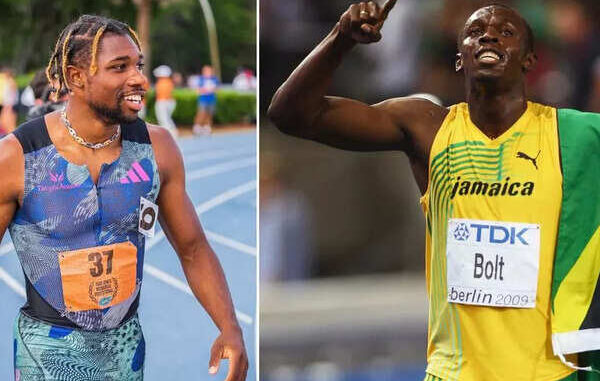
The athletics world is on fire after one of the most explosive exchanges ever seen between two of sprinting’s greatest figures. Noah Lyles, the flamboyant American sprinter who has steadily risen to the top of world athletics, sent shockwaves around the globe when he equaled Usain Bolt’s iconic 200m record—a mark that had stood unchallenged for over a decade. But it wasn’t just the run that stirred controversy. Moments after crossing the finish line, Lyles boldly declared himself the “new king of speed,” a direct challenge to the throne once occupied by the larger-than-life Jamaican legend.
For over a decade, Usain Bolt was untouchable. His electrifying performances in Beijing 2008, Berlin 2009, London 2012, and Rio 2016 established him not just as the fastest man alive, but as a sporting phenomenon who transcended athletics. His world records in the 100m (9.58) and 200m (19.19) became untouchable milestones. Fans, commentators, and even athletes referred to Bolt as “immortal.” Yet now, Noah Lyles has shattered that aura by matching the legendary 200m mark, and with it, sparking a rivalry that no one saw coming.
Lyles, known for his confidence and showmanship, did not mince words after his record-equalling run. “It’s a new era,” he declared, staring into the cameras with fire in his eyes. “I respect what Bolt has done, but history doesn’t wait forever. The crown has to move, and I’m the one wearing it now.” His comments immediately set social media ablaze, with fans divided between hailing Lyles as the rightful heir and accusing him of disrespecting the man who revolutionized sprinting.
Usain Bolt, never one to back down from a challenge, responded swiftly. In a fiery statement, the Jamaican great reminded the world of his dominance. “Records are one thing, but true greatness is proven over years, under pressure, against the best. I did it all, time and time again. Noah can celebrate his moment, but one race does not make you king. The throne is earned, not claimed.” His words carried the weight of a man whose legacy has defined a generation.
The clash of egos has ignited what fans are now calling an “unrelenting war” between two track titans. Analysts point out that Lyles, while supremely talented, still has much to prove if he wants to surpass Bolt’s legacy. Bolt won three consecutive Olympic gold medals in both the 100m and 200m, dominated relay races, and became the face of track and field worldwide. Lyles, on the other hand, has displayed brilliance but is still in the process of cementing a legacy as enduring as the Jamaican’s.
What makes this rivalry so compelling is the stark contrast between their personalities. Bolt was playful, smiling, and often lighthearted even before his biggest races. Lyles, by contrast, thrives on intensity and self-belief, wearing his confidence like armor. Their war of words sets the stage for a potential generational debate that could redefine sprinting’s history.
Fans now eagerly await the next chapter: Will Lyles back up his claim with more dominant victories, or will Bolt’s legend continue to overshadow any challenger? What is certain is that the world of athletics hasn’t seen such drama since Bolt first burst onto the scene. Two men, one crown, and a legacy battle that could shape sprinting forever.
Be the first to comment